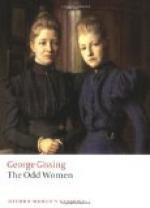’Oh, it will be a marriage of the golden age! Perhaps I shall remember the bride when she was a little girl; and I shall give her a kiss, and pat her on the rosy cheek, and wish her joy. And the bridegroom will be such a good-hearted simpleton, unable to pronounce f and s. I don’t mind that sort of marriage a bit!’
The listeners were both regarding her—Miss Barfoot with an affectionate smile, Everard with a puzzled, searching look, ending in amusement.
‘I must run down into that country some day,’ said the latter.
He did not stay much longer, but left only because he feared to burden the ladies with too much of his company.
Again a week passed, and the same evening found Barfoot approaching the house in Queen’s Road. To his great annoyance he learnt that Miss Barfoot was not at home; she had dined, but afterwards had gone out. He did not venture to ask for Miss Nunn, and was moving disappointedly away, when Rhoda herself, returning from a walk, came up to the door. She offered her hand gravely, but with friendliness.
’Miss Barfoot, I am sorry to say, has gone to visit one of our girls who is ill. But I think she will very soon be back. Will you come in?’
‘Gladly. I had so counted on an hour’s talk.’
Rhoda led him to the drawing-room, excused herself for a few moments, and came back in her ordinary evening dress. Barfoot noticed that her hair was much more becomingly arranged than when he first saw her; so it had been on the last occasion, but for some reason its appearance attracted his eyes this evening. He scrutinized her, at discreet intervals, from head to foot. To Everard, nothing female was alien; woman, merely as woman, interested him profoundly. And this example of her sex had excited his curiosity in no common degree. His concern with her was purely intellectual; she had no sensual attraction for him, but he longed to see further into her mind, to probe the sincerity of the motives she professed, to understand her mechanism, her process of growth. Hitherto he had enjoyed no opportunity of studying this type. For his cousin was a very different person; by habit he regarded her as old, whereas Miss Nunn, in spite of her thirty years, could not possibly be considered past youth.
He enjoyed her air of equality; she sat down with him as a male acquaintance might have done, and he felt sure that her behaviour would be the same under any circumstances. He delighted in the frankness of her speech; it was doubtful whether she regarded any subject as improper for discussion between mature and serious people. Part cause of this, perhaps, was her calm consciousness that she had not a beautiful face. No, it was not beautiful; yet even at the first meeting it did not repel him. Studying her features, he saw how fine was their expression. The prominent forehead, with its little unevenness that meant brains; the straight eyebrows, strongly




